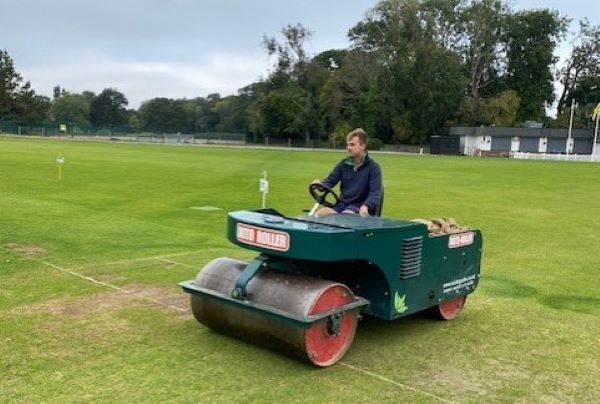A Day in the Life of a Groundsman
The day begins early. The rainwater is cleared and the tarpaulin covers removed. Then a walk-around examination of the square and in particular the twenty two yard strips which have been earmarked for upcoming games.
Josh quickly identifies a damp spot or two on a wicket resulting from a leak in the covers. It is a constant issue caused by spikes, stones and other sharp objects. A patch will be applied later. Ultimately, if there are too many patches the tarp will have to be replaced.
“Rolling a wicket with damp areas [caused by leaks etc] can damage the grass root structure” explains Josh.
Josh Finch is Head Groundsman in Malahide Cricket Club. He started in March of this year replacing the retired Phil Frost. Josh came to Malahide from Lords Cricket Ground where he was on the groundstaff working under Head Groundsman Karl McDermott (formerly of Clontarf Cricket Club). Josh’s main area of responsibility in Lords was on the adjacent Nursery Ground where there are about 60 grass practice strips.
Josh then makes his way over to the grass practice wickets which are located near the Gate Lodge on the Dublin Road side of the Malahide ground. Again the same procedure is followed. The tarp is removed and he gently palms the surface checking the level of firmness, for leaks and any other bumps and lumps. It’s almost like a daily medical check-up except the patient is the ground underneath his feet.
“The grass practice wickets here, there are 5 of them, are good quality and the players like them. And crucially, they protect the square from being overused” explains Josh. “Going forward I hope to spend more time on this practice square. The run ups [on the practice square] also need to be looked at.”
“Do you have a weekly/daily plan of work?” I ask.
“Yes, but you have to be flexible and it’s really dependent on the weather. But first and last always, the preparation of wickets for upcoming games are prioritised. At the moment I have four wickets on the go, three match wickets and one practice strip. Also, the schedule can change due to re-fixtures, new fixtures etc.”
“Was that the same in Lord’s? Did the fixture list change all the time?” I ask.
“No, unscheduled games were a rarity in Lord’s and really only occurred if Middlesex got a home draw for a quarter or semi-final in the domestic cup competitions which wouldn’t have been that often” says Josh.

Josh Finch
And then the real work begins. Although Josh embraces the most up to date developments in ground preparation/machinery he is by his own admission “old school”. He is down on his hands and knees working on the wicket for an upcoming club game at the weekend.
The grass on this wicket [which is near the edge of the square] is a little bit clumpy [tufts of grass]. By careful application of a hand scrubbing brush he raises the grass leaf thus exposing the damp bare patches of soil underneath which can then dry out. The hand brushing can, depending on the state of the wicket, take up to an hour. The upright grass will then be easier to cut. And then the rolling will begin.
Over the summer Josh has carried out this painstaking process on every wicket on the square. Apart from the obvious benefit to each particular strip including consistency of bounce this method allows him to get a close-up in depth knowledge of virtually every blade of grass and every little bump or indent on the square. He admits that this method is time consuming but the knowledge gathered will benefit in the long run.
“How is the outfield?” I ask.
“Some areas are affected by red thread fungus. It will need to be treated.”
Today is Friday so he will cut the outfield later on. This snapshot is really only scratching the surface of his day.
“Will you watch the football game tomorrow? [Ireland play England in Lansdowne Road]?” I ask.
He is a proud Yorkshireman and a dedicated Leeds United supporter. “I’ll keep an eye out for it!”
Brian Gilmore
September 2024